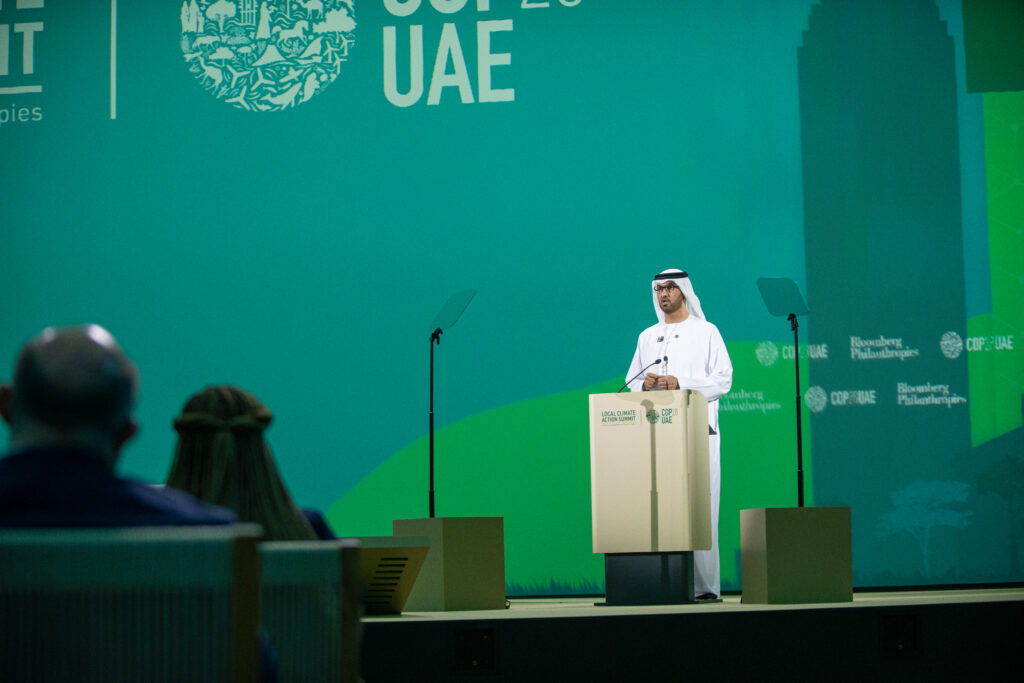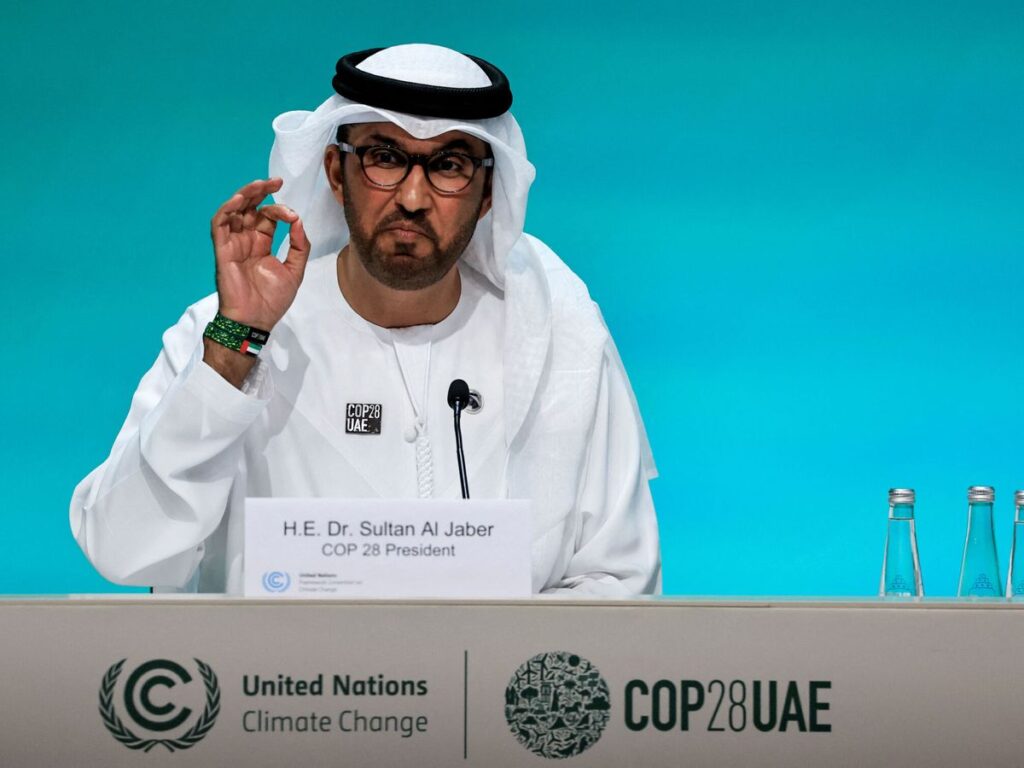Comenzó la 28ª cumbre climática de la ONU en Emiratos Árabes Unidos, el gigante petrolero que acoge el encuentro con poca ambición. Cumplir con la urgente tarea de reducir los gases de efecto invernadero y resarcir los daños siguen siendo las metas de un plan que no plantea medidas de fondo. Los países más pobres y vulnerables están sufriendo las enormes consecuencias. La agenda en la COP28 no plantea cambios en la raíz productiva. Las vías para una salida ecosocialista.
Por Carolina Menéndez Trucco
Siguiendo la paradoja del mentiroso (“esta oración es falsa”), bien podría haberse encuadrado así la conferencia de las Naciones Unidas sobre el cambio climático. El encuentro, que reúne a líderes de gobiernos, negocios, ONG y sociedad civil de todo el mundo del 30 de noviembre al 12 de diciembre para alcanzar soluciones concretas a las problemáticas medioambientales, se llevó a cabo para sorpresa de todos en Emiratos Árabes Unidos, la cuestionada monarquía petrolera.
El controvertido anfitrión (la puerta trasera para los combustibles fósiles) había comenzado ya socavando el espíritu de la cumbre. La BBC lo reveló justo antes de que comenzara la conferencia a través de documentos oficiales filtrados que arrojaron luz acerca de cómo el país árabe planeaba utilizar el evento para discutir acuerdos de petróleo y gas con 15 naciones. “Estas acusaciones son falsas, incorrectas e inexactas”, sin embargo, replicó el CEO petrolero y ministro de Industria, Sultan Bin Ahmad Al-Jaber, que dirige la compañía estatal de petróleo y gas ADNOC, cuestionado también por presidir este año la COP28.
Pero no todo empezó con el pie “izquierdo”. El día de la inauguración de la Conferencia Mundial sobre el Clima en la Expo City de Dubai hubo una gran alegría por el éxito, cuando los Estados acordaron las reglas para el fondo de daños y pérdidas y los primeros países también asumieron compromisos financieros para ello. Adoptaron una reparación destinada a compensar a los más vulnerables al calentamiento global, ya que la mayor parte de las víctimas se da en los sitios que no producen CO₂. Nadie esperaba que esto sucediera tan pronto en un tema controvertido. De todas formas, el impulso inicial no puede ocultar el hecho de que aún quedan por delante negociaciones difíciles, en un marco bastante contradictorio. El séptimo productor mundial de petróleo alberga el espacio que espera eliminar gradualmente todos los combustibles fósiles.
Alta (o baja) ambición
Un grupo de países dentro de la cumbre, la Coalición de Alta Ambición, aboga por propuestas “progresistas” con grandes objetivos, como el cumplimiento del límite superior de 1,5 grados, triplicar la capacidad de las energías renovables y, como punto clave: eliminar progresivamente la producción y uso de todas las energías fósiles. Las exigencias son razonables, pero que se puedan concretar es otro asunto. Mientras los líderes globales discuten la agenda ambiental en la COP28, la Organización Mundial de la Salud, publicó un preocupante informe sobre los récords que se batieron. Desde el año más cálido, hasta incendios, ciclones, deshielos e inundaciones; el abanico de catástrofes es extenso. El Informe sobre brechas de producción de este año del Programa de las Naciones Unidas para el Medio Ambiente tampoco es alentador. Los principales países productores de combustibles fósiles pretenden producir el doble de carbón, petróleo y gas. Si llevan adelante estos planes, es evidente que no alcanzarán el objetivo de los 1,5 grados. En este contexto, incluso para la Coalición de Alta Ambición, es dudoso lograr el suficiente peso diplomático para alcanzar sus demandas en las negociaciones de la cumbre.



Un rumbo en zigzag
Las conferencias mundiales sobre el clima siempre se han caracterizado por bloques cambiantes: entre países más industrializados y contaminantes, y los no desarrollados, entre aquellos que abogan por la protección del clima y los que más sufren las consecuencias. Pero en esta COP28 hay una cuestión crucial que divide a los 198 países participantes: los productores de petróleo y gas, y aquellos que presionan por la salida de los mismos. Pues, la eliminación gradual del petróleo se convierte en una prueba de fuego. Tanto el líder de la conferencia, como muchos gobiernos, están en desacuerdo sobre la cuestión de eliminar (y cómo) los combustibles fósiles.
Básicamente, la pregunta es si las tecnologías de captura, almacenamiento y uso de CO₂ pueden desempeñar un papel importante o no. Esto abriría una puerta para que se pueda seguir quemando carbón, petróleo y gas, dado que los gases perjudiciales para el clima en teoría se podrían capturar y almacenar, es decir, utilizar “con sensatez”, al menos para sus defensores. Sin embargo, el Panel Intergubernamental sobre Cambio Climático (IPCC) supone que las tecnologías de almacenamiento solo desempeñarán un papel menor en la transición energética, se encuentran en fase de prueba y plantean grandes riesgos.
Un desfile vacío
A pesar del consenso científico sobre la existencia de una crisis medioambiental, todavía hay personas que se resisten a creerlo. Un estudio de la revista Global Environmental Change analiza el fenómeno de los negacionistas del cambio climático. Australia, Nueva Zelanda, Noruega y EE.UU. tienen los porcentajes más altos de personas que niegan el calentamiento global. En España, por el contrario, sólo el 2% de los encuestados niega el progresivo aumento de temperaturas. ¿Y Argentina? Pues el flamante presidente tal vez se ubique entre los primeros: Javier Milei se autoproclamó “negacionista” y aunque asuma en plena cumbre, no participará de los últimos dos días ni enviará a ningún delegado. El Ministerio de Ambiente, por cierto, será uno de los 10 que desaparecerán.
Alternativa ecosocialista
Por más de que la cumbre plantee la eliminación gradual de los combustibles fósiles para 2050 como imprescindible, los informes de investigadores climáticos de universidades e institutos presentados también lo desarrollen, y los países hayan firmado el compromiso, la reunión mundial para abordar la emergencia climática más allá de las formalidades no aporta demasiado. Más bien, recalca que sólo el 18% de las grandes empresas energéticas, el 3% de los países productores de petróleo y el 3% de los países productores de gas están planeando eliminar gradualmente los combustibles fósiles. La decisión del primer día (el fondo de pérdidas y daños) en una arquitectura global dañada y en un sistema que no funciona, sin dudas, no basta.
Por otro lado, hablar de justicia social para los países pobres, como osadamente se ha escuchado al comienzo de la cumbre, para los ecosocialistas es puro ruido. El apartheid del agua en Palestina que lleva adelante el genocida Estado de Israel es el ejemplo extremo. El coletazo del aumento de los precios de los combustibles fósiles tras la invasión a Ucrania, otro cimbronazo. El mundo está interconectado y, por desgracia, lleno de ejemplos, por ello mismo la lucha ambiental debe tener en la mira al capitalismo. El verdadero cambio climático y social amerita una revolución productiva de todo el sistema en su conjunto en la perspectiva del socialismo.




